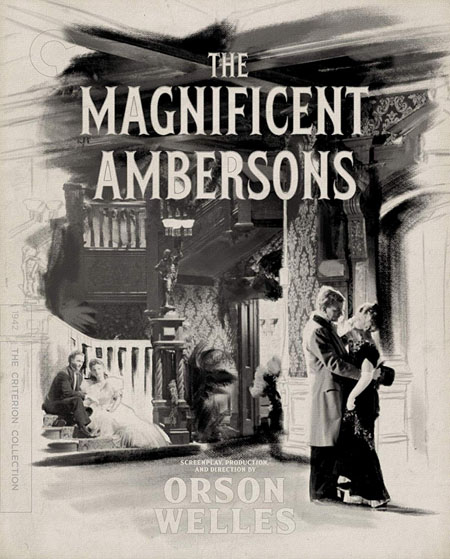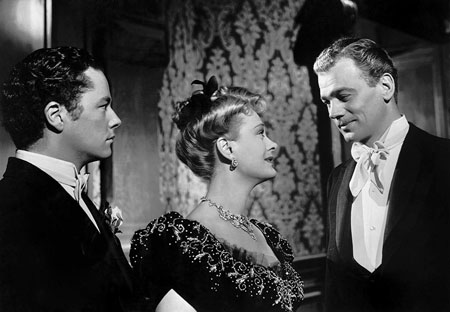
“A STOLEN
MASTERPIECEâ€
By Raymond Benson
In
a fascinating interview supplement contained on this amazing new release by The
Criterion Collection, film historian Joseph McBride calls The Magnificent Ambersons one of the great Hollywood tragedies in
that the film we got from writer/director Orson Welles was not the one he
intended. It is widely known that RKO Radio, the studio behind the production,
deleted forty-three minutes from Welles’ final cut, reshot the ending, and
released the film their way—all
against Welles’ wishes—and then promptly destroyed the cut footage so that the
movie could never be reconstructed.
The Magnificent
Ambersons
is a stolen masterpiece.
That
said, the film is still a great
movie. In fact, it earned Oscar nominations for Best Picture, Best Supporting
Actress (Agnes Moorehead), Best Cinematography (Black & White, by Stanley
Cortez), and Best Art/Interior Set Decoration (Black & White).
Ambersons, based on Booth
Tarkington’s 1918 novel (Welles claims that Tarkington was a “friend†of his
father’s), the picture was the director’s follow-up to Citizen Kane. Once again featuring some of the Mercury Players
(Joseph Cotten, Ray Collins, and Moorehead) and new casting choices (Dolores
Costello, Tim Holt, Anne Baxter), the production of Ambersons went well, with the picture going only a little over
budget. Welles delivered a 148-minute cut—and then Pearl Harbor happened.
Welles was appointed by Nelson Rockefeller to be a goodwill ambassador to Latin
America so that he could attempt to persuade South American countries from
entering the war on the Axis side.
Welles
dutifully went to Brazil and started shooting a film (It’s All True, another picture sabotaged by RKO) and was
essentially unavailable to receive notes and requests from RKO regarding Ambersons. RKO, unhappy with the film,
then took it upon themselves to change it to suit their needs, and there was
nothing Welles could do about it. The picture released in July 1942 was
88-minutes in length.

Would
a Magnificent Ambersons that is an
hour longer be a better film than it already is? We can only assume. For one
thing, the ending was drastically different. Welles’ version was cynical, dark,
and ironic. Given the wartime climate, RKO wanted a more upbeat ending—never
mind that it really doesn’t make sense that the characters suddenly change
entire attitudes they have held throughout the film. Never mind that the final
half-hour of the movie feels choppy, rushed, and out-of-rhythm from the first
hour. The 88-minute version is what we have and must live with.
It
should be stated again—The Magnificent
Ambersons is still a great picture.
The
story concerns the wealthy Amberson family in the early 1900s Indianapolis. Beautiful
Isabel Amberson (Costello) marries Wilbur Minafer (Don Dillaway) instead of
Eugene Morgan (Cotten), but she regrets it… and she and Morgan carry torches
for each other for the remainder of their days. Enter Isabel and Wilbur’s
bratty son, George (Holt), who terrorizes the town with his bad manners,
arrogance, and boorishness. Things get complicated when he begins to woo
Morgan’s daughter Lucy (Baxter) and at the same time insult and humiliate her
father. All the while, Wilbur’s sister Fanny (Moorehead) also carries
unrequited love for Morgan and inserts herself into the already-touchy
situation.
Ultimately,
Ambersons is about the downfall of a
respected and wealthy family to that thing called Progress—namely, the
invention and proliferation of the automobile and other industrial evolutions.
Welles makes an ecological statement with the picture (back in 1942!) which is
something else RKO was unhappy with, seeing that American industries had to
ramp up to support the war effort.
Criterion’s
new 4K digital restoration looks marvelous, and it contains two separate audio
commentaries with scholars Robert L. Carringer and James Naremore, and critic
Jonathan Rosenbaum.
The
packaging is first-rate. The numerous and excellent supplements alone make the
product a 5-star purchase. Especially interesting and informative are the new
interviews with (previously mentioned) McBride and one with film historian
Simon Callow. Both men relate different insights into the history of the
production and the editing debacle. Director Welles appears on a 1970 segment
of The Dick Cavett Show (along with second
guest Jack Lemmon) for an often-hilarious and always-entertaining half-hour
discussion. New video essays on the cinematography and Bernard Herrmann’s uncredited score (that was also chopped
up with RKO’s editing), by Francois Thomas and Christopher Husted,
respectively, are a welcome addition.
Also
included is the silent version of Ambersons,
originally called Pampered Youth (1925),
and re-edited for the U.K. as Two to One (1927).
If that wasn’t enough, we get two Mercury Theatre radio plays: the 1939
adaptation by Welles of Ambersons (with
Welles playing the role of George), and a 1938 adaptation of Seventeen, another Booth Tarkington
creation. There’s more, such as audio interviews with Welles by Peter
Bogdanovich and at an AFI symposium, and the theatrical trailer. The booklet
comes in a stapled “manuscript†that resembles a typed screenplay. It contains
essays by authors and critics (Molly Haskell, Luc Sante, Geoffrey O’Brien,
Farran Smith Nehme, and Jonathan Lethem), and excerpts from a Welles memoir.
The Magnificent
Ambersons,
even in its sadly truncated form, further
illustrates the genius that was Orson Welles. This Criterion release is a
must-have.
CLICK HERE TO ORDER FROM AMAZON